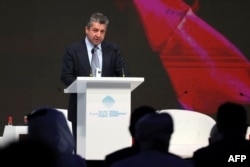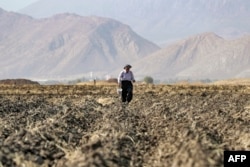Top officials of the Kurdistan Regional Government of Iraq, who are dealing with a dire financial crisis at home, are attending this week's United Nations climate change summit in the United Arab Emirates hoping to gain enough international support to fight climate change in their region, hit by "extreme droughts."
On Thursday, Kurdistan Region President Nechirvan Barzani and Prime Minister Masrour Barzani traveled to Dubai to participate in the U.N. Conference of the Parties, or COP28.
Speaking to VOA, Haval Ahmad, head of the Climate Change Department of the Kurdistan Regional Environmental Board, said his government wished to discuss their plans to fight climate change, saying that "climate adaptation is highly significant for the Kurdistan Region."
"We need help on the key areas of agriculture, water and the ecosystem," said Ahmad, who will be speaking on a panel about Kurdistan and Iraq's climate change problem.
The U.N. and Iraqi officials in the past have warned about the effects of climate change on Iraq. In November of 2022, the U.N. resident coordinator for Iraq, Ghulam M. Isaczai, called climate change "the biggest threat Iraq has ever faced."
And early last month, scientists at the World Weather Attribution group warned that in Iraq, along with Iran and Syria, a three-year drought was made more "extreme" by climate change and was intensifying naturally dry conditions into a humanitarian crisis.
They found in their study that was released November 8 that severe droughts will be more common in the future because of global warming.
"This is already touching the limits of what some people are able to adapt to," said Friederike Otto, a climate scientist with the Grantham Institute at the Imperial College in London and one of the authors of the study.
For officials in northern Iraq's Kurdistan, adapting to the changes will require resources that the region is not ready to pay for.
The Kurdish government has not been able to pay salaries of its employees for three months because of its ongoing financial and energy disputes with the Iraqi central government.
But Kurdish officials seem to recognize how quickly their region is being affected by rising temperatures and decreasing rainfalls and have turned to citizens to help save the ecosystem.
"Today, Kurdishness means protecting the environment, water and soil of our country," Kurdish Deputy Prime Minister Qubad Talabani told citizens last year, equating the strong sense of Kurdish nationalism and decades of national struggle with the challenge of climate change.
In June, Talabani held a meeting with 16 consular and diplomatic envoys in the Kurdistan Region to plead for their help "before it is too late."
Local environmental organizations say that rising temperatures and changes in rainfall have parched water supplies and increased deadly flooding — an issue challenging the Kurdish government's plan to turn its focus from energy to agriculture.
Maroof Majid, president of Aynda (Future) Organization for Environmental Protection in the Kurdistan Region, said the threats of climate change on the region's environment "are serious and must be taken seriously."
Majid told VOA during a phone call Thursday, "Kurdistan Region has a population of about 6 million people, but there are more than 2,150,000 private vehicles, and the public transportation is very poor. And according to our data, out of 2.5 million acres of forest land, [1 million hectares] 50% of it has been destroyed in the past few years."
The decrease in water resources is most alarming, Majid said, pointing to the region's capital, Irbil, as an example.
"In most parts of Irbil, people don't find water anymore, even after digging 700 meters underground. And equally concerning is the decrease of water levels at Little Zab, Great Zab, and Sirwan River due to drought or its retention by the neighboring countries," he said.
Iraqi officials blame the dwindling water flows from its north to several dams built by Turkey and Iran. Iraq's two major water resources, the Tigris and Euphrates, both flow from Turkey, placing water at the center of Turkish relations with Iraq.






